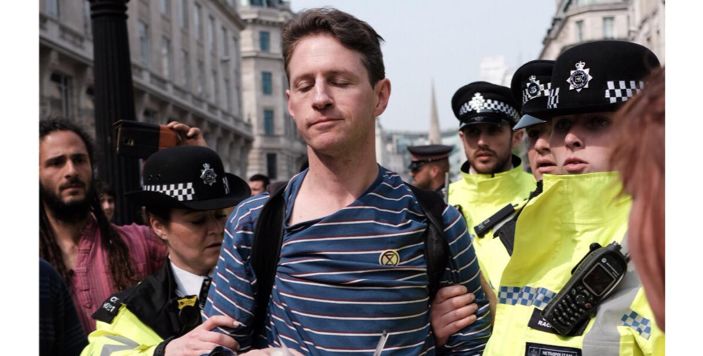
‘Prosecution by the ecocidal state’: Cambridge professor charged for his participation in April’s Extinction Rebellion protests
Gonville and Caius fellow Dr Jason Scott-Warren was fined £800
Last April, the climate change activism group Extinction Rebellion organised a series of mass demonstrations across central London.
Over 11 days, 1,130 arrests were made under section 14 of the Public Order Act.
English fellow Dr Jason Scott-Warren was one of those arrested, and today, he was charged at London Magistrates’ Court on the grounds that there are other more reasonable ways to tackle climate change, such as via the ballot box.
On Twitter, he called his trial a "prosecution by the ecocidal state", and said he feels "sad, angry nauseous [and] proud" to be appearing in court.
He has also said he can afford his £800 fine and is "proud" to pay it in the name of climate change action.
Oxford Circus, Marble Arch, Waterloo Bridge and the area around Parliament Square were occupied during the April demonstrations. Oxford Circus was blocked with a boat, to which activists glued themselves, along with gazebos, potted plants and trees and a skate ramp. Protesters glued themselves across the entrances to the London Stock Exchange, and Shell Oil’s headquarters were targeted.
Scott-Warren, 48, is a tireless climate campaigner, best-known for his one-man protest outside his local BP petrol station. For three months, he stood outside the garage every so often, holding an anti-BP placard for onlooking drivers to take in.
He told Cambridgeshire Live: "This protest is really about my irritation at the fact that a petrol station is so normal, part of the landscape – yet companies making profits out of fossil fuels are destroying the planet.”
In October, Extinction Rebellion launched another series of protests in London, dubbed the ‘Autumn Uprising’. Not only were thousands of arrests made, but the police also introduced a blanket ban under section 14 preventing all climate campaigners from protesting in London.
The move, described as ‘chilling’ by human rights activists, was later deemed unlawful by the High Court. The police controversially treated the campaign of events as one single event to which all of Section 14’s powers applied.









































